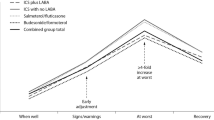Abstract
Appropriate management of persistent asthma, according to US and international guidelines, requires daily use of controller medications, most generally, inhaled corticosteroids (ICS). This approach, although effective and well established, imposes burdens of treatment and side effects onto asthma patients. A growing body of evidence suggests that patients with persistent asthma need not be managed with daily ICS, but rather can use them on an intermittent basis, occasioned by the occurrence of symptoms sufficient to warrant treatment with a rescue inhaler. Large, randomized, controlled studies, over a range of asthma severity, and in a range of ages from pediatrics to adults, suggest that, in well-selected patients, a symptom-based approach to administering controller therapy may produce equivalent outcomes, while reducing exposure to ICS. The concept of providing anti-inflammatory treatment to the patient, at the time inflammation is developing, is termed ‘temporal personalization’. The evidence to date suggests that symptom-based controller therapy is broadly useful in selected asthma patients, and is a management approach that could be incorporated into US and international guidelines for asthma.
Similar content being viewed by others
Abbreviations
- ACRN:
-
US Asthma Clinical Research Network
- BASALT:
-
Best Adjustment Strategy for Asthma in the Long Term
- BEST:
-
Beclomethasone plus Salbutamol Treatment
- ICS:
-
Inhaled corticosteroids
- IMPACT:
-
Improving Asthma Control
- MIST:
-
Maintenance vs. Intermittent inhaled Steroids in wheezing Toddlers
- NHLBI:
-
US National Heart Lung and Blood Institute
- NO:
-
Nitric oxide
- TREXA:
-
Treating children to prevent Exacerbations
References
Papers of particular interest, published recently, have been highlighted as: •• Of major importance
NHLBI National Asthma Expert Panel 2007. Guidelines for the Diagnosis and Management of Asthma. NIH Publication 08-4051; August 2007.
Sont JK, Willems LN, Bel EH, van Krieken JH, Vandenbroucke JP, Sterk PJ. Clinical control and histopathologic outcome of asthma when using airway hyperresponsiveness as an additional guide to long-term treatment. The AMPUL Study Group. Am J Respir Crit Care Med. 1999;159:1043–51.
Leuppi JD, Tandjung R, Anderson SD, Stolz D, Brutsche MH, Bingisser R, et al. Prediction of treatment-response to inhaled corticosteroids by mannitol-challenge test in COPD. A proof of concept. Pulm Pharmacol Ther. 2005;18:83–8.
Green RH, Brightling CE, McKenna S, Hargadon B, Parker D, Bradding P, et al. Asthma exacerbations and sputum eosinophil counts: a randomised controlled trial. Lancet. 2002;360:1715–21.
Smith AD, Cowan JO, Brassett KP, Herbison GP, Taylor DR. Use of exhaled nitric oxide measurements to guide treatment in chronic asthma. N Engl J Med. 2005;352:2163–73.
Boushey HA, Sorkness CA, King TS, et al. Daily versus as-needed corticosteroids for mild persistent asthma. N Engl J Med. 2005;352(15):1519–28.
Papi A, Canonica GW, Maestrelli P, et al. Rescue use of beclomethasone and albuterol in a single inhaler for mild asthma. N Engl J Med. 2007;356(20):2040–52.
•• Martinez FD, Chinchilli VM, Morgan WJ et al. Use of beclomethasone dipropionate as rescue treatment for children with mild persistent asthma (TREXA): a randomised, double-blind, placebo-controlled trial. Lancet. 2011 Feb 19;377(9766):650-7. doi:10.1016/S0140-6736(10)62145-9. Epub 2011 Feb 14. This paper describes the use of inhaled steroids as part of rescue treatment in children. A well-designed and well-conducted study, TREXA was the product of the US Childhood Asthma Research and Education (CARE) Network, funded by the NHLBI.
•• Zeiger RS, Mauger D, Bacharier LB, et al. Daily or intermittent budesonide in preschool children with recurrent wheezing. N Engl J Med. 2011;365(21):1990–2001. doi:10.1056/NEJMoa1104647. This MIST study, although not specifically an asthma trial, did address the question of whether intermittent inhaled steroid therapy might control important asthma outcomes as well as daily maintenance therapy. This study was also conceived and performed under the aegis of the CARE Network. Collectively with TREXA, the data suggest that many pediatric asthma patients can be managed with intermittent, symptom-based controller therapy.
•• Calhoun WJ, Ameredes BT, King TS, et al. Comparison of physician-, biomarker-, and symptom-based strategies for adjustment of inhaled corticosteroid therapy in adults with asthma: the BASALT randomized controlled trial. JAMA. 2012;308(10):987–97. doi:10.1001/2012.jama.10893. BASALT was the definitive trial of symptom-based inhaled steroid therapy in adults. Patients with mild–moderate asthma, whose asthma could be controlled on low dose ICS alone, were equivalently controlled using guideline-, biomarker-, or symptom-based adjustments of ICS dosing. This trial was performed by the NHLBI Asthma Clinical Research Network (ACRN).
Acknowledgment
This study was conducted with the support of the Institute for Translational Sciences at the University of Texas Medical Branch, supported in part by a Clinical and Translational Science Award (UL1TR000071) from the National Center for Advancing Translational Sciences, National Institutes of Health.
Compliance with Ethics Guidelines
ᅟ
Conflict of Interest
Rohit Divekar, Bill T. Ameredes, and William J. Calhoun declare that they have no conflict of interest.
Human and Animal Rights and Informed Consent
With regard to the author’s research cited in this paper, all institutional and national guidelines for the care and use of laboratory animals were followed. In addition, all procedures were followed in accordance with the ethical standards of the responsible committee on human experimentation and with the Helsinki Declaration of 1975, as revised in 2000 and 2008.
Author information
Authors and Affiliations
Corresponding author
Rights and permissions
About this article
Cite this article
Divekar, R., Ameredes, B.T. & Calhoun, W.J. Symptom-Based Controller Therapy: A New Paradigm for Asthma Management. Curr Allergy Asthma Rep 13, 427–433 (2013). https://doi.org/10.1007/s11882-013-0375-7
Published:
Issue Date:
DOI: https://doi.org/10.1007/s11882-013-0375-7




